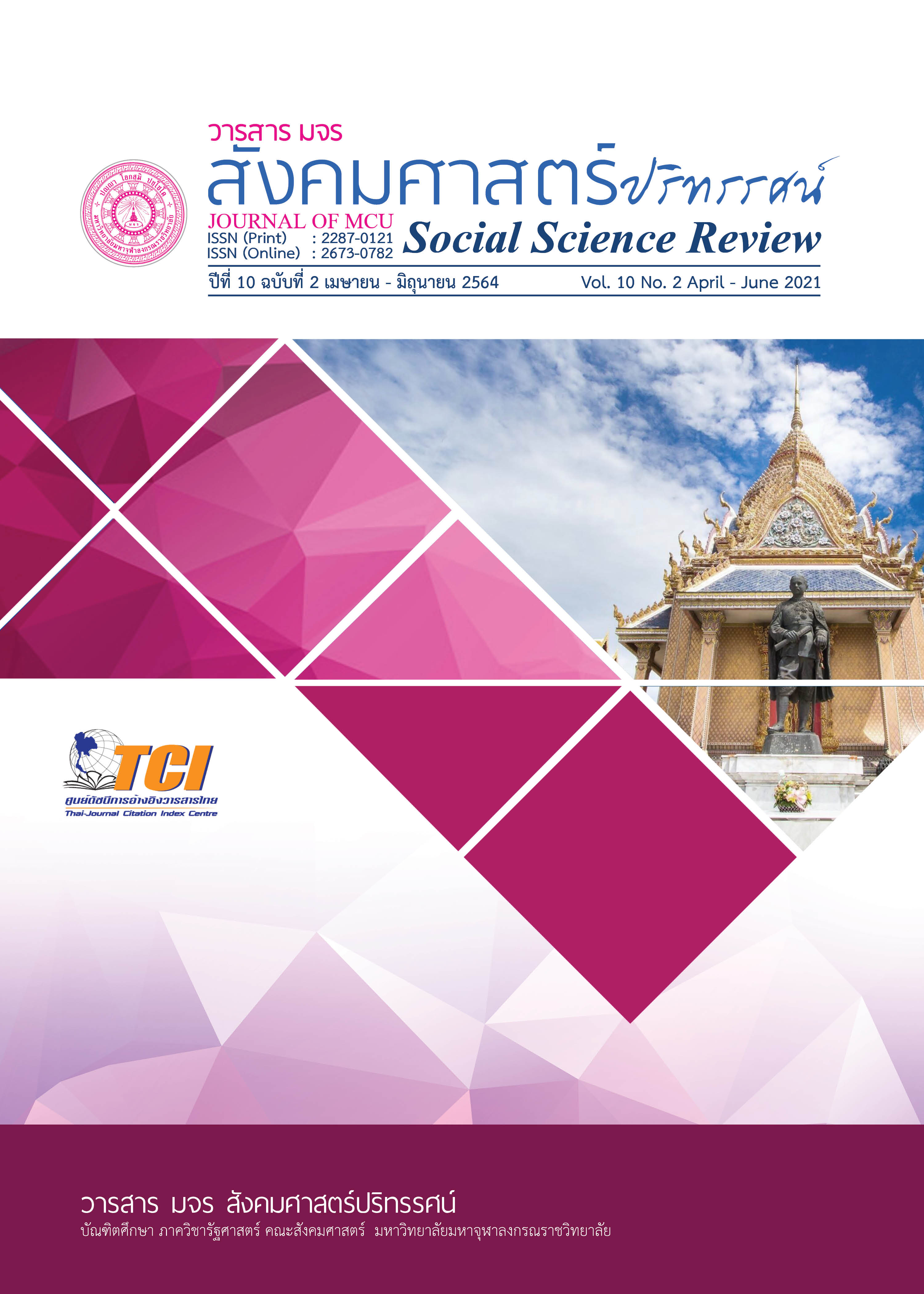การพัฒนารูปแบบการบริหารจัดการการท่องเที่ยวเชิงวัฒนธรรมในจังหวัดสระบุรี
คำสำคัญ:
การพัฒนารูปแบบ, การบริหารจัดการการท่องเที่ยว, การท่องเที่ยวเชิงวัฒนธรรมบทคัดย่อ
บทความวิจัยนี้มีวัตถุประสงค์ 1. เพื่อศึกษาวิเคราะห์สภาพปัจจุบัน ปัญหาอุปสรรค การบริหารจัดการการท่องเที่ยวเชิงวัฒนธรรม 2. เพื่อศึกษากระบวนการพัฒนารูปแบบการบริหารจัดการการท่องเที่ยวเชิงวัฒนธรรม 3. เพื่อนำเสนอการพัฒนารูปแบบการบริหารจัดการการท่องเที่ยวเชิงวัฒนธรรมในจังหวัดสระบุรี การวิจัยเป็นแบบผสานวิธี การวิจัยเชิงปริมาณ สุ่มตัวอย่างแบบหลายขั้นตอน ได้กลุ่มตัวอย่าง จำนวน 359 รูปเก็บข้อมูลด้วยแบบสอบถาม วิเคราะห์ข้อมูลด้วยโปรแกรมทางสังคมศาสตร์ และการวิจัยเชิงคุณภาพ เลือกแบบเจาะจง ผู้ให้ข้อมูลสำคัญ 18 รูปหรือคน เก็บข้อมูลด้วยการสัมภาษณ์เชิงลึก และการสนทนากลุ่มเฉพาะจำนวน 9 รูปหรือคน วิเคราะห์ข้อมูลด้วยเชิงพรรณนา
ผลการวิจัยพบว่า 1. สภาพปัจจุบันของการบริหารจัดการแหล่งท่องเที่ยวเชิงวัฒนธรรม คือ วัดมีทรัพยากรการท่องเที่ยว สิ่งปลูกสร้างที่สวยงาม มีกิจกรรมวัฒนธรรมประเพณีในวันสำคัญทางพระพุทธศาสนา ด้านปัญหา อุปสรรค ชุมชนรอบ ๆ จัดวางสิ่งของไม่เป็นระเบียบ มีสุนัขจรจัดและคนจรจัดใช้เป็นที่พักผ่อน ร้านค้าวางขายไม่เป็นระเบียบ 2. กระบวนการบริหารจัดการท่องเที่ยวเชิงวัฒนธรรม ด้านการโฆษณาและประชาสัมพันธ์ใช้การพิมพ์ซอง ติดป้ายไวนิล ส่วนบุคลากรเป็นผู้มีอายุที่มีจิตอาสาช่วยงานกิจกรรม การบริการข้อมูลข่าวสาร และการจัดสถานที่ถ่ายภาพเป็นที่ระลึก การรักษาความปลอดภัย ติดตั้งกล้องวงจรปิดและมีเจ้าหน้าที่คอยดูแล 3. การพัฒนารูปแบบการบริหารจัดการการท่องเที่ยวเชิงวัฒนธรรม ด้านการโฆษณาและประชาสัมพันธ์ ควรจัดทำแผนที่การท่องเที่ยว เว็บไซต์/ เพจ/ Facebook/ Instagram/ Line/ YouTube ภาษาอังกฤษ ภาษาอาเซียน บุคลากรควรจัดฝึกอบรมด้านภาษาต่างประเทศ และเปิดรับฟังข้อร้องเรียน/ข้อเสนอแนะ/เพื่อปรับปรุงแก้ไข และควรมีเจ้าหน้าที่ดูแลรักษาความปลอดภัยตลอดเวลา
เอกสารอ้างอิง
กระทรวงการท่องเที่ยวและกีฬา. (2554). แผนพัฒนาการท่องเที่ยวแห่งชาติ พ.ศ. 2555–2559. กรุงเทพฯ: กระทรวงการท่องเที่ยวและกีฬา.
ธานินทร์ ศิลป์จารุ. (2551). การวิเคราะห์และวิจัยข้อมูลทางสถิติด้วย SPSS (พิมพ์ครั้งที่ 9). กรุงเทพฯ: บิสซิเนสอาร์แอนด์ดี.
บัวผิน โตทรัพย์. (2562). การศึกษาการประชาสัมพันธ์การท่องเที่ยวผ่านสื่อสังคมออนไลน์ : กรณีศึกษาชุมชนพุมเรียง อำเภอไชยา จังหวัดสุราษฎร์ธานี (วิทยานิพนธ์ปริญญาปรัชญาดุษฎีบัณฑิต สาขาวิชานิเทศศาสตร์). สุราษฎร์ธานี: มหาวิทยาลัยราชภัฏสุราษฎร์ธานี.
บุญเลิศ จิตตั้งวัฒนา. (2548). การพัฒนาการท่องเที่ยวแบบยั่งยืน : Sustainable Tourism Development. กรุงเทพฯ: การท่องเที่ยวแห่งประเทศไทย.
พระครูใบฎีกาสุรพล อาสโภ (แย้มชุ่ม). (2558). การพัฒนารูปแบบงานสาธารณสงเคราะห์ตามกระบวนทัศน์วิถีพุทธ (วิทยานิพนธ์ปริญญาพุทธศาสตรดุษฎีบัณฑิต สาขาวิชาการจัดการเชิงพุทธ). พระนครศรีอยุธยา: มหาวิทยาลัยมหาจุฬาลงกรณราชวิทยาลัย.
พระครูสันติธรรมาภิรัต (บุญชัย สนฺติกโร). (2557). การพัฒนารูปแบบการปกครองคณะสงฆ์ในเขตปกครองคณะสงฆ์ภาค 15 (วิทยานิพนธ์ปริญญาพุทธศาสตรดุษฎีบัณฑิต สาขาวิชาการจัดการเชิงพุทธ). พระนครศรีอยุธยา: มหาวิทยาลัยมหาจุฬาลงกรณราชวิทยาลัย.
พระปลัดคำนวน อนงฺคโณ (เรืองรัตน อนามโย). (2556). การพัฒนาระบบภูมิสารสนเทศของแหล่งท่องเที่ยวเชิงวัฒนธรรมในจังหวัดจันทบุรี (วิทยานิพนธ์ปริญญาพุทธศาสตรดุษฎีบัณฑิต สาขาวิชาการพัฒนาสังคม). พระนครศรีอยุธยา: มหาวิทยาลัยมหาจุฬาลงกรณราชมหาวิทยาลัย.
ภูวเดช สินทับศาล. (2561). รูปแบบการจัดการท่องเที่ยวเชิงวัฒนธรรมในอุทยานประวัติศาสตร์สุโขทัย (วิทยานิพนธ์ปริญญาพุทธศาสตรดุษฎีบัณฑิต สาขาวิชาพระพุทธศาสนา). พระนครศรีอยุธยา: มหาวิทยาลัยมหาจุฬาลงกรณราชมหาวิทยาลัย.
สำนักงานพระพุทธศาสนาจังหวัดสระบุรี. (2562). ระเบียบวาระการประชุมคณะสงฆ์จังหวัดสระบุรี ครั้งที่ 9/2562 วันที่ 12 กันยายน 2562. สระบุรี: สำนักงานเจ้าคณะจังหวัดสระบุรี.
สำนักงานวัฒนธรรมจังหวัดสระบุรี. (2558). แผนปฏิบัติการสำนักงานวัฒนธรรมจังหวัดสระบุรี ปีงบประมาณ 2558. กรุงเทพฯ: กระทรวงวัฒนธรรม.
โสทรินทร์ โชคคติวัฒน์. (2561). รูปแบบยุทธศาสตร์การส่งเสริมการท่องเที่ยวเชิงพุทธในอาเซียนระหว่างราชอาณาจักรไทยและสาธารณรัฐแห่งสหภาพเมียนมาร์ (วิทยานิพนธ์ปริญญาพุทธศาสตรดุษฎีบัณฑิต สาขาวิชาพระพุทธศาสนา). พระนครศรีอยุธยา: มหาวิทยาลัยมหาจุฬาลงกรณราชมหาวิทยาลัย.
อภิสรา จ่ายเจริญ. (2559). รูปแบบการส่งเสริมการท่องเที่ยวขององค์กรปกครองส่วนท้องถิ่นภาคกลางตอนบน (วิทยานิพนธ์ปริญญาพุทธศาสตรดุษฎีบัณฑิต สาขาวิชารัฐประศาสนศาสตร์). พระนครศรีอยุธยา: มหาวิทยาลัยมหาจุฬาลงกรณราชมหาวิทยาลัย.
ดาวน์โหลด
เผยแพร่แล้ว
รูปแบบการอ้างอิง
ฉบับ
ประเภทบทความ
สัญญาอนุญาต
ลิขสิทธิ์ (c) 2021 วารสาร มจร สังคมศาสตร์ปริทรรศน์

อนุญาตภายใต้เงื่อนไข Creative Commons Attribution-NonCommercial-NoDerivatives 4.0 International License.
เพื่อให้เป็นไปตามกฎหมายลิขสิทธิ์ ผู้นิพนธ์ทุกท่านต้องลงลายมือชื่อในแบบฟอร์มใบมอบลิขสิทธิ์บทความให้แก่วารสารฯ พร้อมกับบทความต้นฉบับที่ได้แก้ไขครั้งสุดท้าย นอกจากนี้ ผู้นิพนธ์ทุกท่านต้องยืนยันว่าบทความต้นฉบับที่ส่งมาตีพิมพ์นั้น ได้ส่งมาตีพิมพ์เฉพาะในวารสาร มจร สังคมศาสตร์ปริทรรศน์ เพียงแห่งเดียวเท่านั้น หากมีการใช้ภาพหรือตารางหรือเนื้อหาอื่นๆ ของผู้นิพนธ์อื่นที่ปรากฏในสิ่งตีพิมพ์อื่นมาแล้ว ผู้นิพนธ์ต้องขออนุญาตเจ้าของลิขสิทธิ์ก่อน พร้อมทั้งแสดงหนังสือที่ได้รับการยินยอมต่อบรรณาธิการ ก่อนที่บทความจะได้รับการตีพิมพ์ หากไม่เป็นไปตามข้อกำหนดเบื้องต้น ทางวารสารจะถอดบทความของท่านออกโดยไม่มีข้อยกเว้นใดๆ ทั้งสิ้น





